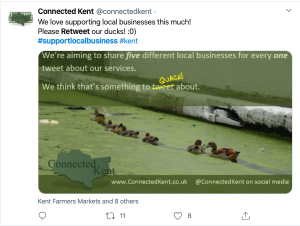Rapidly changing economic conditions and the resulting ambiguity and uncertainty means you may need to discard all your previous business planning. Now is the time to revisit your marketing thinking. Here are 4 practical habits you can adopt to become an agile and adaptable marketer, deliver results more rapidly and helping you to take action faster.
Understanding customers’ needs and behaviours, using past trends to predict future ones, and anticipating what issues and opportunities are about to arise are key ingredients in great marketing planning. Until recently, we were able to use these components to set budgets and formulate schedules.
We are currently lacking that certainty and predictability as we face economic ambiguity and watch business rules change around us. We need to adapt as our customers work and behave in new, unexpected ways.
Now is the time to develop a different approach to the marketing puzzle, and alter the way you think about marketing. It is time to become an agile marketer.
Conserving cash and reducing excess waste should be your primary focus. Campaigns need to be delivered rapidly, and results should be produced quicker than usual in response to the rapidly changing landscape. Progress should not screech to a halt – keep your marketing engine running in these challenging times and come out on top when the time is right.
The 4 habits of an agile marketer
- Bet small, win big
- Experimenting is the new planning
- Aim for progress rather than perfection
- Convert data into insights
Bet small. Win big.
What is the key when gambling? You need to take small risks first before you make that one big bet.
The same applies to marketing. When you bet small you reduce the risk, which will lead to a bigger payoff further down the line. If something doesn’t work, make a U-turn and try again – the more small ideas we try the closer we come to delivering results.
It’s fairly obvious that now is not the time to be pushing out large marketing campaigns. It is, however, the time to start experimenting with micro marketing campaigns. These small-scale experiments enable us to delve into research, anticipate market reactions, and prepare you for that one big bet.
Here are 5 small marketing inspirations:
- Fine-tuning your marketing automation campaigns and lead nurturing programs
- Sharpening up your social media activities, starting with your profiles
- Gain feedback from current customers and target market through use of small market research projects
- Focus on one of your marketing personas or propositions through use of small, highly targeted advertising campaigns. Measure responses through clicks and other popular metrics.
- Update the content, messaging and promotions on your website.
Experimenting is the new planning.
Right now, the future is unpredictable. Tomorrow’s happenings are uncertain, let along what will happen next quarter, or even next month.
It’s time to adapt your mindset and start developing a new set of processes. It is important to identify new options, test new alternatives, and explore exciting possibilities.
The most important factor right now is the means that you have at your disposal. Let’s use Jeff Bezos (Amazon) as an example – he is running as many experiments per unit of time possible.
How do I implement this?
You need to shift from you usual deliberate marketing strategy to an emergent marketing strategy . Each day you should learn something new, by creating hypotheses and testing each one to check success rates.
What should these experiments look like?
- Testing A/B split tests on new propositions and messaging. One place to start is to split test your Facebook advertising
- Experimenting with innovative forms of content on your website
- Developing new offers and pushing them out to specific target markets
- Leveraging the results of a bad situation – levels of competition and advertising costs are lower. Take advantage.
Most importantly – don’t fall victim to the plague of analysis paralysis in your marketing planning.
Aim for progress over perfection.
It is within our power, as marketers, to make constant and continuous progress. Over time with a constant and committed marketing effort we will see more impressive results.
Don’t fret over perfection – our focus needs to be on the power of small actions. Remember, with each small change we make we are moving forward. Don’t let the fear of imperfection paralyze your marketing efforts.
Ask yourself: when is “good enough”, good enough? How can you make progress quickly?
- Concentrate on time to market. Anticipate any factors that may slow you down (lack of crucial information, out of date admin tasks, lags in approval of work). Set a deadline to have your campaign live, and work to that.
- Collaborate with a dependable partner. If you have useful contacts who will help you to achieve your goals, use them. Now is not the time to start everything from scratch. Leverage others’ experience to roll out campaigns rapidly.
- Understand the cost of delay. What price will you pay if you choose to hold back on an experiment or campaign? Will that lost time be worth it for the final few tweaks in an effort for perfection?
Convert data into insights.
You’ve reached the final step in the process. Whilst rolling out these small, experimental campaigns, you must ensure that you’re effectively tracking results and sharing them with the team.
Your results are not opinions or estimations – you have proven, real-world data which will be invaluable when establishing your next small bets.
By collating and sharing the data in real time, you will be able to make smarter collaborative decisions and implement improved tactics in your next experiments. If your campaign was not successful, don’t fudge the data to suggest otherwise. You need to learn from mistakes use the accurate data to formulate the next step. Don’t be afraid to scrap the whole idea and start over if it didn’t work out.
What can your data tell you?
- What messaging is most effective in achieving engagement and click-throughs?
- How successful have your efforts been in trying new forms of content, such as webinars or video?
- Which content has generated the most interest?
- What are your competitors doing right now, marketing-wise?
Digital & Social Articles on Business 2 Community
(81)







